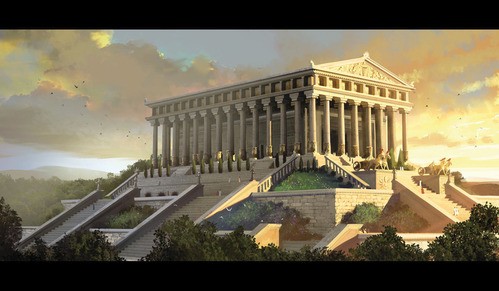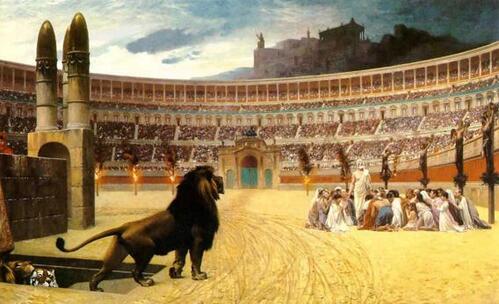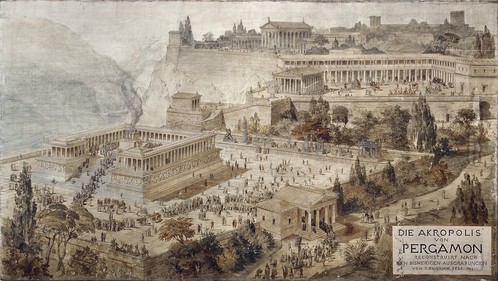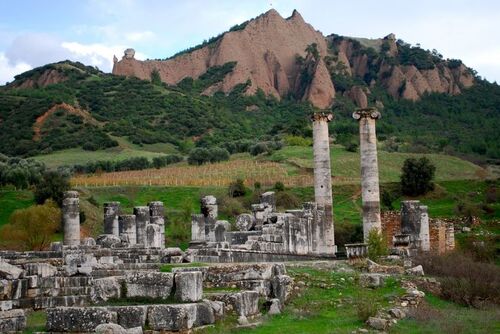Revelation Chapter 2:
The Church of Ephesus: (A.D. 30-100)
“He that holds the seven stars in His right hand, who walks in the midst of the seven golden candlesticks;”
Revelation 2:1
This is how Jesus addresses Himself to the church of Ephesus. It is awesome to think of Jesus holding His messengers in His right hand as He walks among the churches. As we noted before, these lamp stands represent the universal church. The stars, or messengers, represent pastors of the individual churches around the world. It shows the importance of pastors allowing Jesus to guide them. Not to say that Jesus does not speak to others also, but He usually speaks through the pastors. It is a serious thing to stand against a true pastor who seeks the Lord’s guidance, else we find ourselves standing against the Lord Himself!
As Jesus walks in the midst of the church, He sees and knows every problem, every need, and every victory taken. And acts accordingly.
“For where two or three are gathered together in My name, there am I in the midst of them.” Matthew 18:20
Jesus uses this description as He tells not only the Ephesus church but each of the 7 churches, “I know thy works.” Nothing is hidden from Him, therefore His judgments are just.
“He that holds the seven stars in His right hand, who walks in the midst of the seven golden candlesticks;”
Revelation 2:1
This is how Jesus addresses Himself to the church of Ephesus. It is awesome to think of Jesus holding His messengers in His right hand as He walks among the churches. As we noted before, these lamp stands represent the universal church. The stars, or messengers, represent pastors of the individual churches around the world. It shows the importance of pastors allowing Jesus to guide them. Not to say that Jesus does not speak to others also, but He usually speaks through the pastors. It is a serious thing to stand against a true pastor who seeks the Lord’s guidance, else we find ourselves standing against the Lord Himself!
As Jesus walks in the midst of the church, He sees and knows every problem, every need, and every victory taken. And acts accordingly.
“For where two or three are gathered together in My name, there am I in the midst of them.” Matthew 18:20
Jesus uses this description as He tells not only the Ephesus church but each of the 7 churches, “I know thy works.” Nothing is hidden from Him, therefore His judgments are just.

Temple of Diana in Ephesuses
vs 2-4 Ephesus was a church with many good works. They labored much for the Lord, unto weariness and pain. They were constant in patience and cheerful endurance, unwilling to give up. They gave no place to evil in their midst or to false apostles. Nevertheless…all of these good works stemmed from a natural effort, which is of no value to Christ – because they had left their first love.They put their service for Christ ahead of their love for Him (See 1 Corinthians 13:1-3).
When we become more occupied with good works than with spending quality time in fellowship with Jesus, we risk leaving our first (chief) love, and He is not pleased.
“Remember therefore from whence thou art fallen, and repent, and do the first works;” Revelation 2:5
vs. 5 Remember. Repent. And renew fellowship with Jesus. Do the “first works,” that is, those works which stem from loving Jesus supremely. The warning to the church, if they would not repent, was Jesus would remove their lampstand out of its place. Thus they would no longer be a light for the Lord. This is true today of either an individual assembly or believer.
vs. 6 This church hated the deeds of the Nicolaitanes, which Jesus also hated. “Nicolaitanes” comes from the word Nikao, meaning “to conquer or overthrow,” and Laos, which means “the people of laity.” It is not clearly understood just what group or sect is meant by the Nicolaitanes; however, from the word’s meaning, it may refer to the order of clergy asserting wrongful authority over the lay people. Also, some believe the Nicolaitanes were a sect which taught that what you do in your body does not affect your spirit, giving license to sin (for more, check got questions? ).
vs. 7 Whatever is meant here, the church of Ephesus was in agreement with Jesus on this false doctrine, and He commends them. He then promises the overcomers they will be able to eat of the tree of life, which is in the paradise of God. In other words, they will have eternal life and enjoy the blessings of heaven.
The Church of Smyrna: (A.D. 100-312)
When we become more occupied with good works than with spending quality time in fellowship with Jesus, we risk leaving our first (chief) love, and He is not pleased.
“Remember therefore from whence thou art fallen, and repent, and do the first works;” Revelation 2:5
vs. 5 Remember. Repent. And renew fellowship with Jesus. Do the “first works,” that is, those works which stem from loving Jesus supremely. The warning to the church, if they would not repent, was Jesus would remove their lampstand out of its place. Thus they would no longer be a light for the Lord. This is true today of either an individual assembly or believer.
vs. 6 This church hated the deeds of the Nicolaitanes, which Jesus also hated. “Nicolaitanes” comes from the word Nikao, meaning “to conquer or overthrow,” and Laos, which means “the people of laity.” It is not clearly understood just what group or sect is meant by the Nicolaitanes; however, from the word’s meaning, it may refer to the order of clergy asserting wrongful authority over the lay people. Also, some believe the Nicolaitanes were a sect which taught that what you do in your body does not affect your spirit, giving license to sin (for more, check got questions? ).
vs. 7 Whatever is meant here, the church of Ephesus was in agreement with Jesus on this false doctrine, and He commends them. He then promises the overcomers they will be able to eat of the tree of life, which is in the paradise of God. In other words, they will have eternal life and enjoy the blessings of heaven.
The Church of Smyrna: (A.D. 100-312)

Spectators watch while Christians are killed by lions
vs. 8 The word Smyrna means “myrrh.” Myrrh is a bitter herb which when crushed, emit a fragrance. This expresses the terrible persecution brought upon the believers during the 2nd – 3rd century. Hundreds of thousands of Christians were martyred during this time by crucifixion, thrown to lions, burned at the stake, and many other ways. How appropriate Jesus addresses this church as being the One Who is “the first and the last, which was dead and is alive,” giving them blessed assurance that He is eternal. Because He lives, they will live forever with Him.
vs. 9 Their works consisted of tribulation and poverty – not what we might consider good works. Yet Jesus’ assessment of them is they are rich! Our riches are never determined by how much or little we have in material possessions. The apostle Paul described himself as,
“having nothing and yet possessing all things.” 2 Corinthians 6:10
Jesus also assures the church He knew what they endured from the blasphemy of those who claimed to be believers, but were really of Satan (see Romans 2:28-29). Any church which does not preach the true gospel of Jesus Christ is a synagogue of Satan – he uses these false teachings to deceive many, leading them astray.
vs. 10 Do not fear these things you’ll suffer. This seems a strange admonition to not fear suffering or death. It would be impossible for the natural man – but for those whose trust is in God, it is not only possible, but suffering becomes a pathway to learning the grace and strength of the Lord. Paul even prayed, “That I may know Him, and the power of His resurrection, and the fellowship of His sufferings, being made conformable to His death.” Philippians 3:10.
It’s unclear what is meant by tribulation for ten days. Some scholars think from Emperor Nero to 312 A.D., there were ten distinct edicts demanding governors to seek out Christians and put them to death. The 10th and last persecutor was Diocletian. This could very well be what “ten days” referred to. (See John Gill’s Exposition for more).
A crown of life is promised to the faithful. This reminds us of James 1:12
“Blessed is the man that endureth temptation; for when he is tried, he shall receive the crown of life, which the Lord hath promised to them that love him.”
See also Romans 8:17-18. Those willing to suffer with the Lord in this life, will reign as joint-heirs with Him in heaven.
vs. 11 The second death mentioned here refers to the lake of fire (Revelation 20:14)
The Church of Pergamon: (A.D. 312-606)
vs. 9 Their works consisted of tribulation and poverty – not what we might consider good works. Yet Jesus’ assessment of them is they are rich! Our riches are never determined by how much or little we have in material possessions. The apostle Paul described himself as,
“having nothing and yet possessing all things.” 2 Corinthians 6:10
Jesus also assures the church He knew what they endured from the blasphemy of those who claimed to be believers, but were really of Satan (see Romans 2:28-29). Any church which does not preach the true gospel of Jesus Christ is a synagogue of Satan – he uses these false teachings to deceive many, leading them astray.
vs. 10 Do not fear these things you’ll suffer. This seems a strange admonition to not fear suffering or death. It would be impossible for the natural man – but for those whose trust is in God, it is not only possible, but suffering becomes a pathway to learning the grace and strength of the Lord. Paul even prayed, “That I may know Him, and the power of His resurrection, and the fellowship of His sufferings, being made conformable to His death.” Philippians 3:10.
It’s unclear what is meant by tribulation for ten days. Some scholars think from Emperor Nero to 312 A.D., there were ten distinct edicts demanding governors to seek out Christians and put them to death. The 10th and last persecutor was Diocletian. This could very well be what “ten days” referred to. (See John Gill’s Exposition for more).
A crown of life is promised to the faithful. This reminds us of James 1:12
“Blessed is the man that endureth temptation; for when he is tried, he shall receive the crown of life, which the Lord hath promised to them that love him.”
See also Romans 8:17-18. Those willing to suffer with the Lord in this life, will reign as joint-heirs with Him in heaven.
vs. 11 The second death mentioned here refers to the lake of fire (Revelation 20:14)
The Church of Pergamon: (A.D. 312-606)

City of Pergamum, now modern Turkeys.
vs. 12 Jesus addresses this church as “He which has the sharp sword with two edges.” This immediately speaks of a need for judgement.
vs. 13 Pergamos was the center of idol worship. The city’s influence and and commercial import rivaled that of Athens. People from all over came to worship in the temples, one of which was the temple of Zeus, often referred to as “Satan’s throne.” The word throne implies the master’s seat, or where the lord of the domain resides and rules. In other words, Satan felt at home in this place! The temple’s remains now reside in Berlin, Germany.
According to tradition, it was in the temple of Zeus where the believer, Antipas, was roasted to death inside a bronze bull, during the reign of Roman Emperor Domitian (A.D. 81-96). Jesus commends the church in Pergamon for holding fast to His name, not denying the faith even in the face of Antipas’ horrible death.
vs. 14 But Jesus had a few things against them – they held fast to the doctrine Balaam and of the Nicolaitanes. In Numbers 22-25, Balaam prophesied for gain of the world’s good, a mentality very prominent today! (See Numbers 31:16, 2 Peter 2:15, & Jude 11). He taught compromise with the world’s ways. The King of Moab, Balak, attempted to bribe Balaam in cursing Israel so they would be defeated. God prevented Balaam from doing this (using a very unusual messenger), so Balaam advised the king to entice Israel to disobey God…thus bring God’s judgment upon them. The wiles of Satan has brought defeat to many all through the year. How important for us to know God’s Word and obey Him only!
vs. 15 The church of Ephesus hated the deeds of the Nicolaitanes, but with some in the church of Pergamon, those deeds became a doctrine they gave place to. Remember the Nicolaitanes had to do with clergy exerting undue authority over the laypeople. It seems these people took the analogy of Jesus’ holding the stars in His hand too far – they gave too much prominence to the leaders of the churches. This extreme practice can be seen in teaching the infallibility of the Pope. Jesus states He hated the deeds of the Nicolaitanes and their doctrine. Should we not agree with our Lord in this?
vs. 16 A solemn warning is given this church to repent, or face judgement by the sharp sword of Jesus’ mouth.
vs. 17 The reward promised to the overcomes of this church is two-fold:
The Church of Thyatira: (A.D. 606-Tribulation)
vs. 12 Jesus addresses this church as “He which has the sharp sword with two edges.” This immediately speaks of a need for judgement.
vs. 13 Pergamos was the center of idol worship. The city’s influence and and commercial import rivaled that of Athens. People from all over came to worship in the temples, one of which was the temple of Zeus, often referred to as “Satan’s throne.” The word throne implies the master’s seat, or where the lord of the domain resides and rules. In other words, Satan felt at home in this place! The temple’s remains now reside in Berlin, Germany.
According to tradition, it was in the temple of Zeus where the believer, Antipas, was roasted to death inside a bronze bull, during the reign of Roman Emperor Domitian (A.D. 81-96). Jesus commends the church in Pergamon for holding fast to His name, not denying the faith even in the face of Antipas’ horrible death.
vs. 14 But Jesus had a few things against them – they held fast to the doctrine Balaam and of the Nicolaitanes. In Numbers 22-25, Balaam prophesied for gain of the world’s good, a mentality very prominent today! (See Numbers 31:16, 2 Peter 2:15, & Jude 11). He taught compromise with the world’s ways. The King of Moab, Balak, attempted to bribe Balaam in cursing Israel so they would be defeated. God prevented Balaam from doing this (using a very unusual messenger), so Balaam advised the king to entice Israel to disobey God…thus bring God’s judgment upon them. The wiles of Satan has brought defeat to many all through the year. How important for us to know God’s Word and obey Him only!
vs. 15 The church of Ephesus hated the deeds of the Nicolaitanes, but with some in the church of Pergamon, those deeds became a doctrine they gave place to. Remember the Nicolaitanes had to do with clergy exerting undue authority over the laypeople. It seems these people took the analogy of Jesus’ holding the stars in His hand too far – they gave too much prominence to the leaders of the churches. This extreme practice can be seen in teaching the infallibility of the Pope. Jesus states He hated the deeds of the Nicolaitanes and their doctrine. Should we not agree with our Lord in this?
vs. 16 A solemn warning is given this church to repent, or face judgement by the sharp sword of Jesus’ mouth.
vs. 17 The reward promised to the overcomes of this church is two-fold:
- To eat the hidden manna. Manna was the food God gave Israel during their forty year period of wandering in the wilderness. Jesus mentioned this in John 6:32-58, teaching His disciples He is the Bread of life. This may be the “hidden” manna in our text, because the natural man does not understand how to partake of Christ as Bread of life.
- A white stone in which a new name is written. It’s been said in ancient times, a person tried in court was handed a black stone, if found guilty. If found innocent, he was handed a white stone. It’s possible this is what Jesus refers to. We know that white symbolizes righteousness, and Jesus is spoken of as the chief corner-stone (1 Peter 2:4-8). The main thought here is to receive more of Jesus. A new name in the stone displays ownership – we belong to Christ.
The Church of Thyatira: (A.D. 606-Tribulation)

Ruins of Thyatira
This church represents the universal church as it was during the dark ages. It was during this time the Islamic religion became strong, as well as Catholicism.
vs. 18 Jesus addresses this church as the Son of God, in contrast to the worship of man or idols. His eyes like a flame represents ability to pierce into the innermost being of all people; His feet like fine brass shows walking in judgement. This description suggests Jesus knew all about this church – their good works and bad.
vs. 19-20 He mentions their good works – love, service, faith, patience, and works. Yet He then tells them even though they have these, He is not pleased with what they were permitting, namely, the same sins which were prominent during Jezebel’s time.
We read about Jezebel in 1 Kings 16:29-32, 21:1-25. She was a prophetess who promoted idolatry, fornication, and total immorality under the guise of religion. Idolatry and fornication has been prominent throughout history, and often mentioned in scripture as things which to flee from.
vs. 21-23 God will always give mankind time to repent, but if we refuse, His judgment will fall. It is believed the judgements mentioned in these verses take us to the 7 years of tribulation when the false church will be judged. See Jeremiah 17:9-10.
vs. 24-25 There were a few in this church who were not in agreement with the false doctrine, or the false practices so prevalent in their midst. The Lord gives them an encouragement to hold fast to what they had until He comes.
vs. 26-27 The promise to the overcomes is a place of rulership over nations, ruling with a rod of iron. This is said of Jesus in Revelation 19:15, so the overcomes of Thyatira will be part of the true church who will rule under the leadership of Jesus.
vs. 28 Jesus also promises them the Morning Star. The idea of a “bright morning star” is a star that outshines all the others, and Jesus is the One who is called “bright.” Perhaps this promise implies being a light to the whole world, as Jesus is (See John 9:5, & Revelation 22:16). The morning star also represents hope, as the star heralds the sun rising in the east. From the shadows of night, hope rises with the dawn.
This church represents the universal church as it was during the dark ages. It was during this time the Islamic religion became strong, as well as Catholicism.
vs. 18 Jesus addresses this church as the Son of God, in contrast to the worship of man or idols. His eyes like a flame represents ability to pierce into the innermost being of all people; His feet like fine brass shows walking in judgement. This description suggests Jesus knew all about this church – their good works and bad.
vs. 19-20 He mentions their good works – love, service, faith, patience, and works. Yet He then tells them even though they have these, He is not pleased with what they were permitting, namely, the same sins which were prominent during Jezebel’s time.
We read about Jezebel in 1 Kings 16:29-32, 21:1-25. She was a prophetess who promoted idolatry, fornication, and total immorality under the guise of religion. Idolatry and fornication has been prominent throughout history, and often mentioned in scripture as things which to flee from.
vs. 21-23 God will always give mankind time to repent, but if we refuse, His judgment will fall. It is believed the judgements mentioned in these verses take us to the 7 years of tribulation when the false church will be judged. See Jeremiah 17:9-10.
vs. 24-25 There were a few in this church who were not in agreement with the false doctrine, or the false practices so prevalent in their midst. The Lord gives them an encouragement to hold fast to what they had until He comes.
vs. 26-27 The promise to the overcomes is a place of rulership over nations, ruling with a rod of iron. This is said of Jesus in Revelation 19:15, so the overcomes of Thyatira will be part of the true church who will rule under the leadership of Jesus.
vs. 28 Jesus also promises them the Morning Star. The idea of a “bright morning star” is a star that outshines all the others, and Jesus is the One who is called “bright.” Perhaps this promise implies being a light to the whole world, as Jesus is (See John 9:5, & Revelation 22:16). The morning star also represents hope, as the star heralds the sun rising in the east. From the shadows of night, hope rises with the dawn.